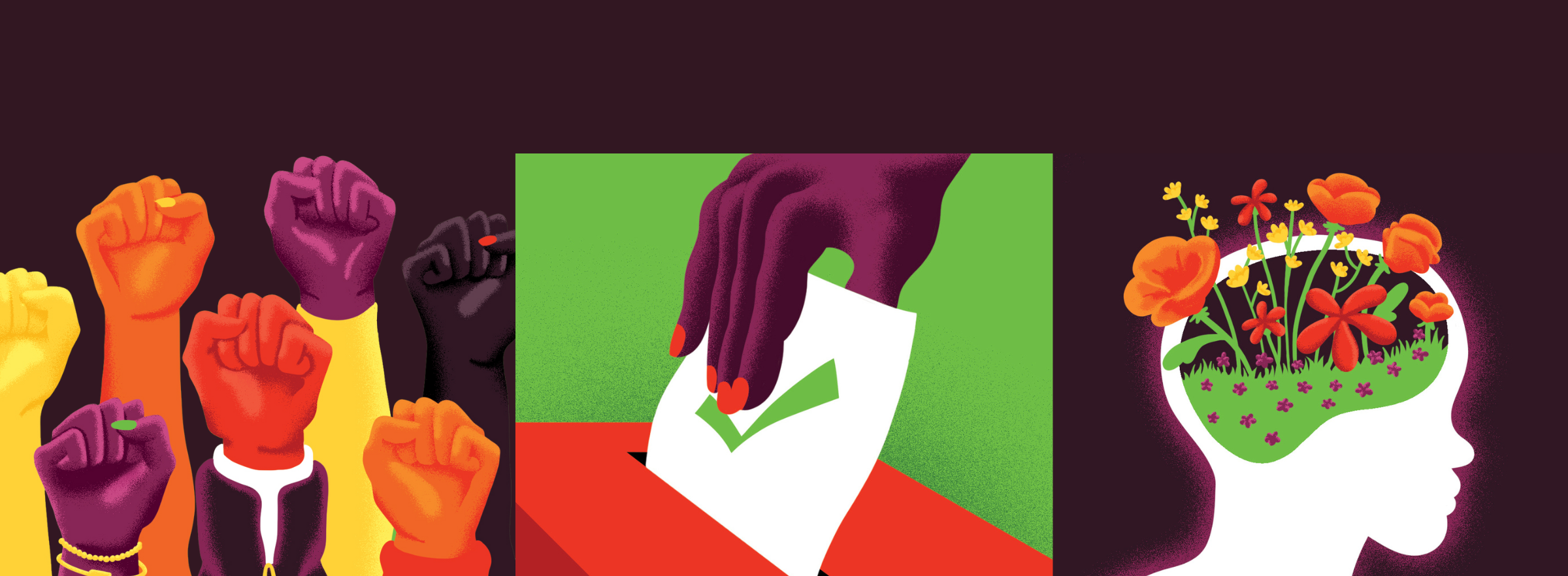
Democracy & Civic Engagement
Voter resources
-
Check your voter registration or register to vote.
Remember:
If you miss the October 15 pre-regisistration deadline, you can still register to vote in person when you cast your ballot. Learn more.
16 and 17 year old Minnesotans are eligible to pre-register to vote.
All Minnesotans who are not currently incarcerated for a felony conviction are now able to register to vote. Learn more.
-
Find your polling place at mnvotes.gov/pollfinder
-
We vote to impact the politics that affect our everyday lives. Use your sample ballot to learn where the candidates asking to represent you stand on issues in your community:
-
You have the right to:
Take time off work to vote without losing pay or PTO
Vote if in line by 8 p.m.
Register to vote on Election Day
Sign in orally
Ask for help, including translation services
Vote if you are not incarcerated for a felony conviction
Bring children to the polls
Vote under guardianship
Vote without being influenced
Get a replacement ballot
File a complaint
Bring a sample ballot
Bring the Voter’s Bill of Rights
-
Early voting for 2025 elections begins on September 19. Election Day is Tuesday, November 4.
Our approach
-
We focus on creating the conditions that will make more possible in our work towards collective liberation. This means that we participate in our democracy by voting, that we hold our elected officials accountable to their campaign promises and push them to deliver more, and that we organize so we can always be ready to come together and protect each other.
-
The people who profit off of our lives and labor know that together, we would have the collective power to make sure we have enough for all. We remember that this is why they work so hard to disenfranchise us, and we stay clear about what this looks like: voter suppression, misinformation, and narratives that try to make us turn on each other instead of building power and moving forward together.
-
As we recognize and organize against the systemic violence of our government, we also recognize that systems are made up of people. We recognize that just as there is no single perfect leader who will deliver us to an abundant future, there is also no single perfect way to disrupt or overthrow an empire.
-
We believe that all actions towards collective care and liberation are valuable — including actions that aren’t rooted in systems of state and federal governance. This can look like taking care of each other through mutual aid networks, organizing our workplaces and neighborhoods and participating in direct actions.
Mapping Potential BIPOC Power
The Our Power, Our Democracy Map gives us a sense of what communities have the highest number of potential BIPOC voters — and the greatest potential to turn up our BIPOC power at the ballot box through targeted engagement.
Voting is one way, among many, to ignite our solidarity and engage our communities to take action. We hope this map helps move us closer to a true democracy — one centered on and defined by racial justice — by growing the capacity of community organizations to engage BIPOC residents this election season and beyond.
Interested in partnering with us to expand democracy and civic engagement? Email Nicole Donoso, VRJ Policy & Democracy Organizer at donoso@voicesforracialjustice.org to connect.
Your election season survival guide
Our zine, What can we imagine? sparks radical imagination, regrounds in agency and possibility, supports emotional regulation, encourages healthy conflict, and offers tools and pathways towards collective power and care - at the ballot box and beyond.
Explore the zine: Turn the pages with your left and right arrow keys
View and download the zine as a PDF by clicking the button below:



